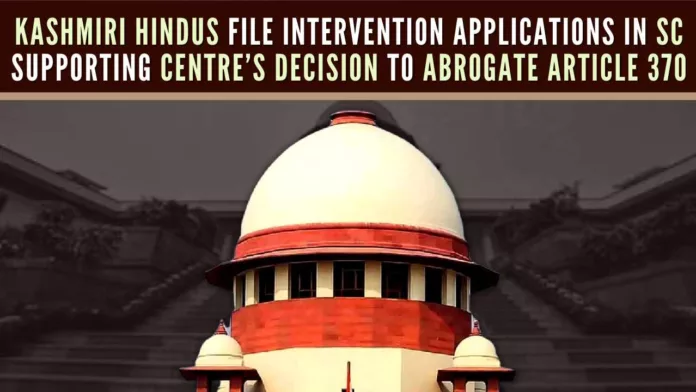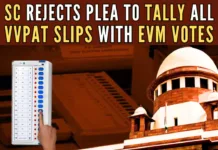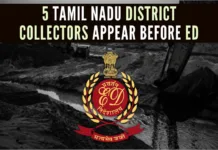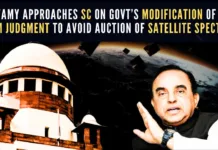
Two intervention applications filed in SC seeking dismissal of pleas challenging Article 370 abrogation
Days before when a Constitution Bench of the Supreme Court is slated to hear the batch of pleas challenging abrogation of Article 370, intervention applications have been filed by Kashmiri Hindus supporting the Centre’s 2019 move stripping special status accorded to the erstwhile state of J&K.
One of the applications has been filed by Youth 4 Panun, through its Secretary, Vithal Chowdhary, a “victim of mass exodus of the Kashmiri Hindus from the valley of Kashmir”.
Youth 4 Panun, focuses on bringing Kashmiri Hindu Youths together and making them work together “for the cause of their homeland”.
The plea said that “Article 370 and Article 35A became a major reason for eroding the sentiment of Indian identity within the Kashmir Valley…. Article 370 and Article 35A were the biggest reason for the lack of psychological integration of the erstwhile State of Jammu & Kashmir with the rest of India and became a breeding ground for separatist ideas leading to the ethnic cleansing of innocent Kashmiri Pandits”.
The intervention application, filed through advocate Siddharth Praveen Acharya, stated that the provisions of Article 370 and Article 35A were in contravention of fundamental rights under the Indian Constitution.
“As per the erstwhile State laws, if a citizen-woman of the erstwhile State married a person of any other State of India, the Jammu & Kashmiri citizenship of such citizen-woman would (cease) to exist. In contrast, if a citizen-woman of an erstwhile State marries a person from Pakistan, such a person would get citizenship of the erstwhile State of Jammu & Kashmir. It, therefore, provided Indian citizenship to foreigners without following the due process of law as mentioned in the Constitution of India,” it contended.
Another intervention application has been moved by Virinder Kaul, a Kashmiri Pandit who “was forced out of Jammu & Kashmir during the turbulent time of 1990“.
“The Applicant welcomes the Constitutional Order 272 and Constitutional Order 273 as both orders were constitutional in nature and Article 370 & Article 35A of the Indian Constitution blatantly disregarded the interest of Kashmiri Pandit Community,” said the application.
Article 370 and the issue of autonomy were designed to be manipulated in such a way that a virtual “Sheikdom or Sultanate or Mini Pakistan” was nurtured with the Indian taxpayer’s money, it claimed. “Article 370 was a dead letter which had to go as it was a temporary Article and by design, it was anti-minorities and the pro-majority of the State Population and this led to the major exodus of the Kashmiri Pandit community since 1947,” stated the application further.
A 5-judge Constitution Bench, headed by Chief Justice of India D Y Chandrachud is scheduled to commence hearing from August 2 on the batch of petitions challenging the 2019 Presidential Order taking away the special status accorded to the erstwhile state of Jammu and Kashmir and its bifurcation into two Union Territories.
The Constitution Bench, also comprising of Justices Sanjay Kishan Kaul, Sanjiv Khanna, B R Gavai, and Surya Kant, would hear the matter consecutively starting from August 2, except for Mondays and Fridays. The clutch of petitions was recently heard on July 11 to complete the necessary pre-hearing formalities since March 2, 2020, when another Constitution Bench ruled against the necessity of referring the matter to a seven-judge bench.
CJI Chandrachud and Justice Khanna are the new members of the latest 5-judge bench as then CJI N V Ramana and Justice Subhash Reddy, who were part of the earlier bench, had retired.
[With Inputs from IANS]
PGurus is now on Telegram. Click here to join our channel and stay updated with all the latest news and views
For all the latest updates, download PGurus App.











Supreme Court is learning things through lawyers and killing their tenure time. Think they should be more petitions, petitions, endless petitions and tire supreme court and consume its all time, so that they get drowned in their own weight. Make sure that they do not deliver any verdict for next 75 years and Supreme Court will sink & die, then a new building can be erected with a good design